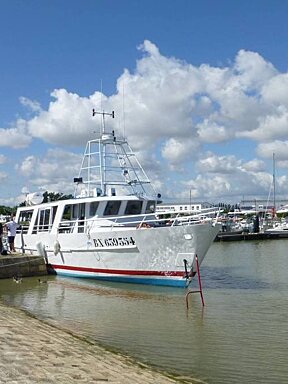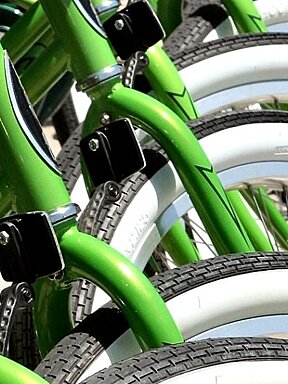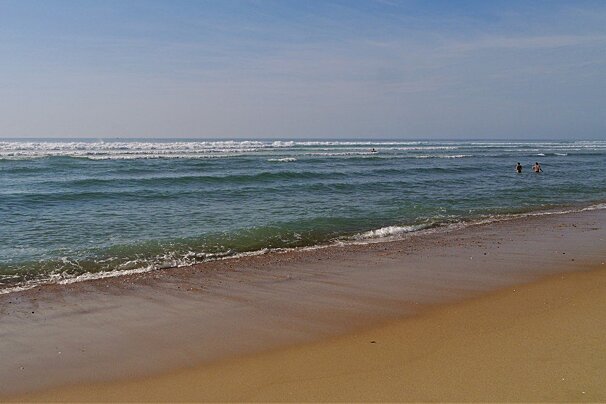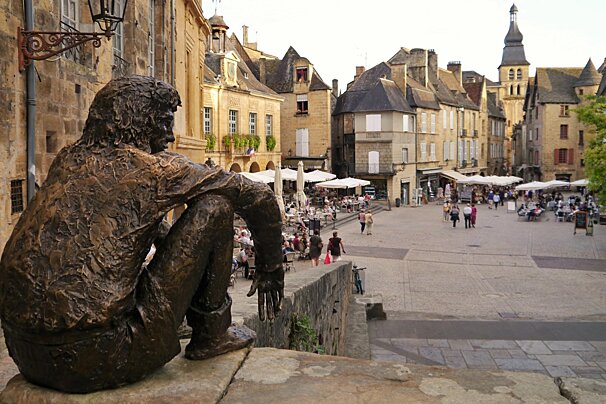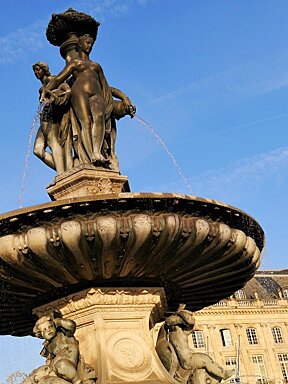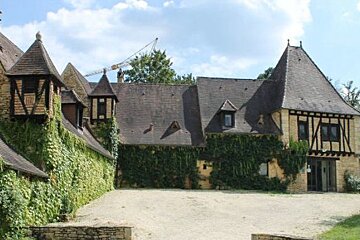
© SeeBordeaux.com
Buying Property in Bordeaux
Discover the Bordeaux property buying process
So why Bordeaux? The countryside, the rivers, the idyllic views, a home from home, the chance to earn a good rental income and investment in a popular destination, are all great reasons to buy here.
Freshly baked diet-defying croissants, delicious cheeses, market fresh produce, and sprawling vineyards are all loveable clichés that attract millions of visitors to France each year.
France’s relatively low property prices have more recently also become a major attraction for many visitors looking to continue their fond holiday memories abroad. As such, France has experienced a surge in the number of Britons taking the plunge across the channel and buying a property here. Sounds perfect doesn't it?!
Low-cost airlines that fly to smaller, local French airports combined with rising UK property prices are contributing factors for the surge in interest in the French property market. For some, the chance to own a second home or holiday villa in France is no longer a dream or a right that’s reserved for the rich and famous. As property in France has become more accessible and affordable, many people have looked to invest.
Historically, areas such as the Cote d'Azur and the Dordogne were popular with those looking to step onto the French property ladder. Now people are buying all over the French continent depending on their individual requirements. Whereas people may have traditionally purchased holiday homes, overseas retirement havens or sound investments in France, it is not so unusual to find the once career hungry individuals who have had enough of the city lifestyle opting for ‘the good life’ and buying a charming rustic chalet in a bustling French ski resort or running a successful business on the south coast of France. There are also some who are fortunate to run a web-based business that is not location-dependent so that they can experience the benefits of living and working in France.
Start buying property
Apart from our own Property For Sale page, in Bordeaux there are many options when purchasing your property:
- Private sale
- Using the services of a notaire
- Through a local estate agent
- At auction
Private sale
Private sales are a direct way of purchasing your property in France. Estate agency fees are typically paid by the seller of a property and are reasonably significant, so usually get added to the asking price. Therefore, by buying direct and avoiding those fees, you can benefit from a lower price. You may find national websites where owners advertise their properties, and also local social media sites and groups, so it's worth joining those. Property for sale will also be advertised in local free papers. And it's not uncommon in France to see a hand written 'for sale' sign in the actual window of the property for sale.
Notaire
A small amount of property in Bordeaux is sold through the local notary, often in the case of an inheritance. A notaire is an independent government official that acts for the state in all transactions during the buying and selling process. Usually chosen by the seller, having a single notaire can make some British buyers feel uneasy about their property purchase. But as a buyer, you have the right to appoint a different notaire to act on your behalf. This doesn't increase the fees, so it is a wise choice particularly if the purchase is complicated or off-plan. To employ a UK-based solicitor is not generally advised as it will add to the fees and they are not familiar with the local market. You can ask your local notaire for their opinion on the price and any pre-contract enquiries that need consideration. In some cases, the notaire may speak English or provide an English-speaking intermediary.
Estate Agents (‘Agents Immobiliers’)
For those who don’t speak fluent French but still wish to buy property in Bordeaux, the option of using an estate agent is generally preferred. You may even find that in popular areas of France you can find estate agents with English speaking services that will assist you. ‘Agents Immobiliers’ are French estate agents - bringing both buyers and sellers together. It is good to check all estate agents in the area you are looking to buy, as it’s not uncommon for a property to be on the market with a number of estate agencies, sometimes at a different price. All estate agents must be properly registered and carry the appropriate ‘Carte Professionnelle’ – allowing them to act as an intermediary and provide sale and purchase contracts. No fee is usually charged for this service; however, it is recommended you sign the sale and purchase documents through a notaire.
At Auction ('Ventes aux Enchères')
As a risky alternative those with a fluency in French could bag a real bargain at auction! French property auctions are not as common as other parts of the world, equating to only 2% of all sales. There are two types: Voluntary and Judicial. Voluntary auctions are called 'ventes à la bougie' and are usually private owners selling their own or inherited property. Judicial auctions are mostly because of liquidations or contested inheritances.
Whichever of the routes you decide to take, you should still always make sure you understand all legal consequences of your actions and any documentation you are asked to sign.
Leaseback property
Leaseback property is an ideal, hassle free option for the pure investor to purchase their property in France. Over the past few years there has been a significant increase in people opting to purchase their development in this manner. But what is leaseback?
The concept of ‘leaseback’ properties is mainly relevant to new developments. You purchase the property 'off plan' on a freehold basis, then immediately lease it back to the property developer for a specified number of years. During your lease period, your property is rented out (usually weekly) on your behalf, where in return you’ll receive a rental income. As the owner of the property, you are still able to make use of it for a certain number of weeks during the year, which will more than likely be specified by the developer, and be in low season.
The only costs you will need to pay are the local French taxes and a co-propriety charge for the building. As an additional bonus, those investing in a leaseback scheme can potentially also recover all VAT (or TVA as it’s called in France) paid on the property providing it is not classified as your primary residence. At present, the rate of TVA in France is 20% so it’s quite a significant proportion of your property price back. Rental returns have fallen in recent years and if you sell your property before the end of the contract, you'll have to pay back some of the TVA. If you sell within five years, you'll have to pay all of the TVA. Speak to a local estate agent to get more advice.
Buying process
So, you've found the perfect property in France and now want to invest? Unsure of your next steps? The following process outlines the general buying process for your French property. You must:
- Make an 'offer d'achat' (offer to buy)
- Sign an initial contract called the 'compromis de vente'
- Pay the deposit for the property
- Complete the sale
Offer d'achat
You put your offer to the owner in writing, either directly or via the estate agent, with any conditions of sale listed. It is important you are clear on any points that your offer depends upon, so there is clarity and no room for any misunderstanding further along.
The compromis de vente
The ‘compromis de vente' is signed by both parties and indicates the formal agreement to the sale of the property. Typically the document includes:
- Details of the purchase price
- A brief description of the property
- Terms and conditions
- Conditions suspensives (a break clause specific to the French process), where applicable
- The completion deadline
Although this is the preliminary contract, you should note that it is legally binding. Before signing, it is important to make sure:
- You understand and agree with everything in the contract
- The contract covers the full agreement of the house purchase
- Any important conditions you have specified with the vendor are included within
- You have sufficient funds available to pay the notaire the deposit for the property
The compromis de vente is the most common form of contract used when buying a property. Occasionally, sellers may elect to use the 'promesse de vente' contract. This offers the buyer slightly more flexibility with an additional ‘option period' to complete the purchase of the property or withdraw your offer altogether, forfeiting your deposit.
In French property law, once your offer is formally accepted there are strict contractual regulations that mean you are legally bound to the property purchase. This eliminates the procedure of 'gazumping' and counter bidding which are common to the British property market. In France there is a moral expectation that a buyer will not pull out of the deal once they have made their offer. If, after agreeing the sale price for the property you have some queries, you should make sure the signing of the compromis is subject to conditional clauses, known as ‘clauses suspensives'. Your queries may relate to the condition of the property, you may wish to find out whether you could obtain planning permission and/or you may simply wish to have a survey done. A clause suspensive will allow for the contract to be cancelled and your deposit refunded if any issues mentioned in the clause are uncovered during further investigations.
Before signing, check with your notaire what paperwork you are required to bring. In drawing up the compromis, the notaire may require you to provide official documentation such as your passport, marriage or divorce papers and your mortgage offer from the bank if relevant.
During the purchase process, the notaire is required to notify the Société d’Aménagement Foncier et d’Establissement Rural (SAFER). In certain circumstances, SAFER may intervene and reject the sale if they feel it is necessary to protect the land you are buying. In this instance, any deposit you have paid will be fully refunded. This type of incident is rare and generally only occurs where the property and land purchased are over 1 hectare (2.47 acres).
The deposit
A non refundable deposit will be paid upon signing of the 'completion of sale' agreement. Included in both a compromis or promesse de vente is a ten day 'cooling off' period; during which time the buyer may withdraw from the contract without significant financial penalty. However, if after the ten days you decide to pull out of the deal, your deposit is non refundable. Your deposit is held by the estate agent or notaire until the final sale completion date.
Completion of sale
After the signing of your compromis de vente, the notaire will begin the legal process for the sale of the property. Completion of the sale can take between three to four months as the notaire has to carry out various searches similar to those done by UK solicitors. The notaire is responsible for checking existing property ownership, any outstanding debts on the property and other such matters.
The final contract is known as the 'acte authentique de vente' (deed of sale). After signing the acte de vente possession of the property formally passes to the buyer. Before the official signing of the acte de vente, it is important you have transferred the full balance of the purchase price, plus any notary fees and taxes, to the notaire’s bank account. As with the deposit, the notaire will hold the funds until the acte de vente has been signed and completed. Where the balance of your property is being paid for by the bank (ie. using a mortgage), you need to ensure that your bank is able to pay the outstanding funds directly to the notaire in sufficient time to clear before the signing date. The sale will not be completed unless the money has cleared the notaire's bank account, and money laundering laws mean that you can’t turn up with a briefcase full of dosh!
Once the deed of sale has been signed, the notaire will provide an ‘attestation d’achat’ or ‘attestation de propriété’ that proves ownership has been passed to you, until formal registration is complete. An exemplified copy of the purchase deed will follow some time later. You should also receive a receipt for the money paid to the notaire for the purchase of the property.
Offer to completion process
During the buying process you will be required to sign official documentation and hand over the required funds to make the property legally yours. Buying property abroad can sometimes become a complicated process, and you should note that in many countries the process varies significantly. It is strongly advised that before committing you arm yourself with all the relevant purchasing information, and complete all necessary financial and structural checks relating to your property. Before signing any official documentation you should make sure you fully understand the legal complexities involved in your purchase and, if possible, make sure you have a notaire fluent in both English and French, so they can explain to you exactly what you are signing.
It is also worthwhile ensuring that your notaire checks the debts against the property, as in some countries once the house sale has been registered you could be liable for any attached debt.
Property buying fees
When buying your dream property in France you should take into account the various fees and taxes. Here are some examples:
- Notaire fees and commission
- Estate agent fees
- Property registration fees (droits d'enregistrement)
- Taxes - 'TVA' (French VAT)
- Foreign currency exchange costs (if applicable)
- Surveyor fees (if applicable)
- Mortgage fees
Notaire fees
The notaire's fees (frais de notaire) is a generic term that covers fees and taxes. It is fixed at the outset and is payable by the purchaser. The deposit is paid to the notaire upon signing the compromis de vente, and additional notaire fees are payable in the form of local and national government taxes. Although they can vary slightly, fees are generally around 7-10% of the property price for older properties and 2% plus TVA (VAT) if the property is less than five years old (frais réduits).
If you buy a property direct from the notaire you should still expect to pay a commission. This can be anything up to 5%.
Estate agent fees
It is not unusual for the property’s sale price to include the commission of the estate agent, usually in France this is paid by the buyer but increasingly by the seller. In fact, this is a question you should ask the estate agent at the beginning of your purchasing process. If you, the buyer, are to be responsible for this payment, legally it should appear in the property advertisement. You should make sure that this is clearly stated within your contract particulars, so that it is not added to the sale price on which the notaire's fees are based. Estate agents can charge anything from 3-10% of a property's selling price.
Property registration fees (droits d'enregistrement)
Land registry fees are similar to the UK's stamp duty and are dependant on the price and age of your property. If you are buying a property that is more than five years old, you can expect to pay a 'droits d'enregistrement' of approximately 5%. Property less than five years old will be subject to fees of less than 1%.
TVA
TVA is France’s equivalent of VAT. As of January 2014 the rate is 20% and will be charged on most fees and commissions.
Foreign currency and foreign exchange rate fluctuations
If you are planning to purchase your overseas property with equity released from the remortgage of a UK property or other cash funds, then you may need to convert your sterling into euros. This can be expensive and risky as you leave yourself open to currency exchange rate fluctuations. For example, from the initial signing of the contract until the completion date, if you are using UK pounds then the amount required to buy the property in euros can change substantially. Sometimes you can end up in a better position if the UK pound goes up against the euro, however, you can also end up significantly out of pocket should the rate move the other way. There are steps you can take to minimise these risks, such as using a company to effectively ‘lock’ your exchange rate months in advance. Today, there are a lot of companies that provide currency exchange risk solutions.
Surveys
In the UK buyers will generally have a survey done on a property, usually as a stipulation of most mortgage lenders. But unlike UK banks and building societies, in France they do not routinely ask for surveys to be completed on properties before issuing loans. Do not be discouraged by people who tell you there is no need to have a survey done. It is advisable to have your survey conducted BEFORE you sign the compromis de vente. Although as a buyer you have your ten day cooling off period, it’s not always possible to arrange a survey during that time. In other words, you run the risk of forfeiting your deposit should you wish to pull out at a later date, after any survey results. This is where 'clauses suspensives' may give you recompense should you change your mind about going ahead with the sale after the survey.
The notaire is responsible for conducting all other searches on the property such as land boundaries, public rights of way, asbestos and termites. The seller is responsible for these costs.
Mortgages
Once you’ve established your interest in purchasing a property in France, the next stage is to arrange your finances and potentially a mortgage in order to proceed. Since you're likely to be buying your property in euros, there's an argument to arranging your mortgage in euros too; meaning that your funds will be less exposed to currency fluctuations.
In France, loan terms differ slightly as monthly repayments tend to be fixed at a set amount, with the length of the loan increasing or decreasing according to the base rate. Mortgages in France are usually between seven and 15 years. As more British buy into the French market, banks are becoming more flexible and offering mortgages with a 25 year duration. In considering your costs with a French mortgage, you should be aware that French banks charge an ‘arrangement fee’ which usually amounts to about 1% of the purchase price, and if you're taking out a French mortgage, you will be required to arrange a life assurance policy for security against the loan. The banks will often push you to buy their insurance, but this is not mandatory, and it may pay to shop around.
French mortgage providers are subject to strict rules imposed by the ‘Banque de France’ which limits the maximum amount that people can spend on their mortgage each month. Under French law, the mortgage lender must consider affordability and whether the individual borrower can actually afford their property purchase. As a general rule, your monthly mortgage payments (plus any additional existing financial commitments such as existing mortgage payments, credit cards, life assurance policy payments, personal loan repayments and other on going contractual commitments) should not exceed one third of your gross monthly income, or annually, approximately 33% of your annual gross income.
If you have insufficient funding for a French mortgage, perhaps as a result of the strict French law, there is always the possibility that you could re-mortgage your principal residence and use the released equity to buy your property in full and in cash. If you proceed with buying in cash, make sure you don't leave yourself vulnerable to foreign currency fluctuations whilst finalising your completion details.
Whichever option you choose, it’s important to make assess your finances accordingly, take professional advice where necessary to ensure you are fully aware of your limitations so that you are not subject to any nasty surprise costs.
General taxes
As a property owner in France, you will find yourself liable for a host of different taxes depending on your individual circumstances. As these can vary immensely from one property owner to the next, it is recommended that you seek further specialist tax and financial planning advice from those in the know. Here is a summary of a few taxes which you may find relevant to your French property purchase:
Wealth Tax
If you own property in France you may be liable for wealth tax on your property. Wealth tax applies whether you are a resident or non-resident of France, as it is dependent on your property value. If you are resident in France (ie. you spend more than 183 days a year there), the tax is levied on your worldwide assets. If you are a non-resident of France, the tax applies to your French assets only. France’s wealth tax is paid in June and is imposed on assets worth more than €1.3m.
Capital gains tax
If you decide to sell your home in France and it is your principal residence, as long as you reinvest any profits made into another property you will not have to pay capital gains tax. If, on the other hand, your home is a second / holiday home or a commercial property that you rent out to generate income, you may be liable to pay tax on any gains you make from the sale. The amount you could be liable for is complicated to calculate and you should take professional advice on this point.
Inheritance tax
When purchasing your property in France, it is wise to give a little consideration to your personal circumstances and longer term tax position. There are 'rules of succession' in France which means that all property passes automatically to the children of the deceased, and under some instances of French law you are not able to dispose of your estate as you may see fit. Inheritance tax in France is not cheap and is pretty complicated. It is highly advisable that you take advice on both the French and UK legal systems before taking the plunge and signing the 'acte de vente'.
Local property taxes
In taking ownership of a property in France you should be aware of the various local taxes which will apply to your property. Land tax (taxe foncière) and occupancy tax (taxe d’habitation) are used to pay for services including refuse collection, street cleaning, schools and other local community facilities. It is important to understand that these two taxes are payable even if your property is just a holiday home. The taxes are set by the local authorities and can vary considerably depending on the area. Tax foncière tends to be the more expensive of the two. It's worth asking the seller for a look at the mots recent tax demands to give you an idea of what you may be paying.
Taxe foncière
This tax is levied on whomever is the owner of the property on 1st January of that year, whether you live there or rent it out. It is calculated using the likely rental value of your home. On the sale of the property it is not unusual for a buyer to be asked to pay their share of the year, based on how many months they will own the property. This will be a part of the contract of sale.
Taxe d'habitation
As of January 2018 this tax is being phased out. It is paid by the occupier of the property, ie. the tenants if you rent out the property annually. It can be paid annually or in monthly instalments from a French bank account. You are potentially exempt from paying the taxe d'habitation if your property is completely empty and has no utilities (ie. water or electricity). However, if you plan to let it out as seasonal tourist accommodation, you may be liable for business rates also, so it is worth investigating what will be required of you.
Foreign property taxes & legalities
Don't rely on your estate agent or seller to furnish you with all the facts. They are, after all, after the sale and won't want you to be delaying the process.
When buying in a foreign country, you should always consider the tax implications of buying, selling and possibly renting out your property. Tax rules and rates can vary immensely from location to location so make sure you've done your homework. Unexpected taxes could be crippling for you further down the line. Your personal tax situation may well be affected as a result of your foreign property purchase, so advice should be sought from a professional who can offer specific guidance on issues such as:
- Taxation in the UK and abroad
- Capital gains tax
- Succession laws and inheritance tax
- Double taxation implications
For example, did you know that if you decide to rent out your property abroad you will need to declare this income to the UK inland revenue and also potentially the country where you have bought the property, no matter how small the sums involved? And, did you know that most countries will apply some form of 'gain taxation' against the sale of a second home? You may therefore wish to set this off against the profit you make on your purchase when selling it at a later date. You should also be aware that some countries have different succession and inheritance taxes and laws that are very different to that in the UK which can lead to expensive traps for the uneducated.
These are just a few areas within the complex subject of property taxes which may, or may not, be applicable to you when purchasing your property abroad. It's vital that you seek solid tax and legal advice before taking the plunge on any type of foreign property.
Please note: foreign property taxation and legal issues are complex and difficult subjects with which you should seek independent advice specific to your requirements. The tax and legal issues outlined here are merely general in nature and therefore no liability is accepted in connection with the information provided.

